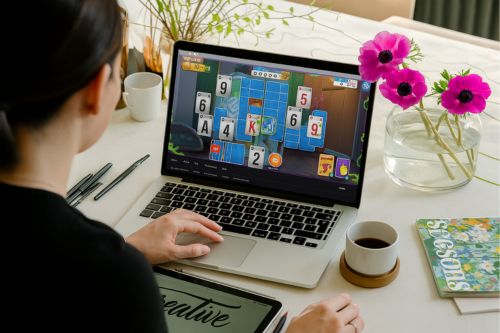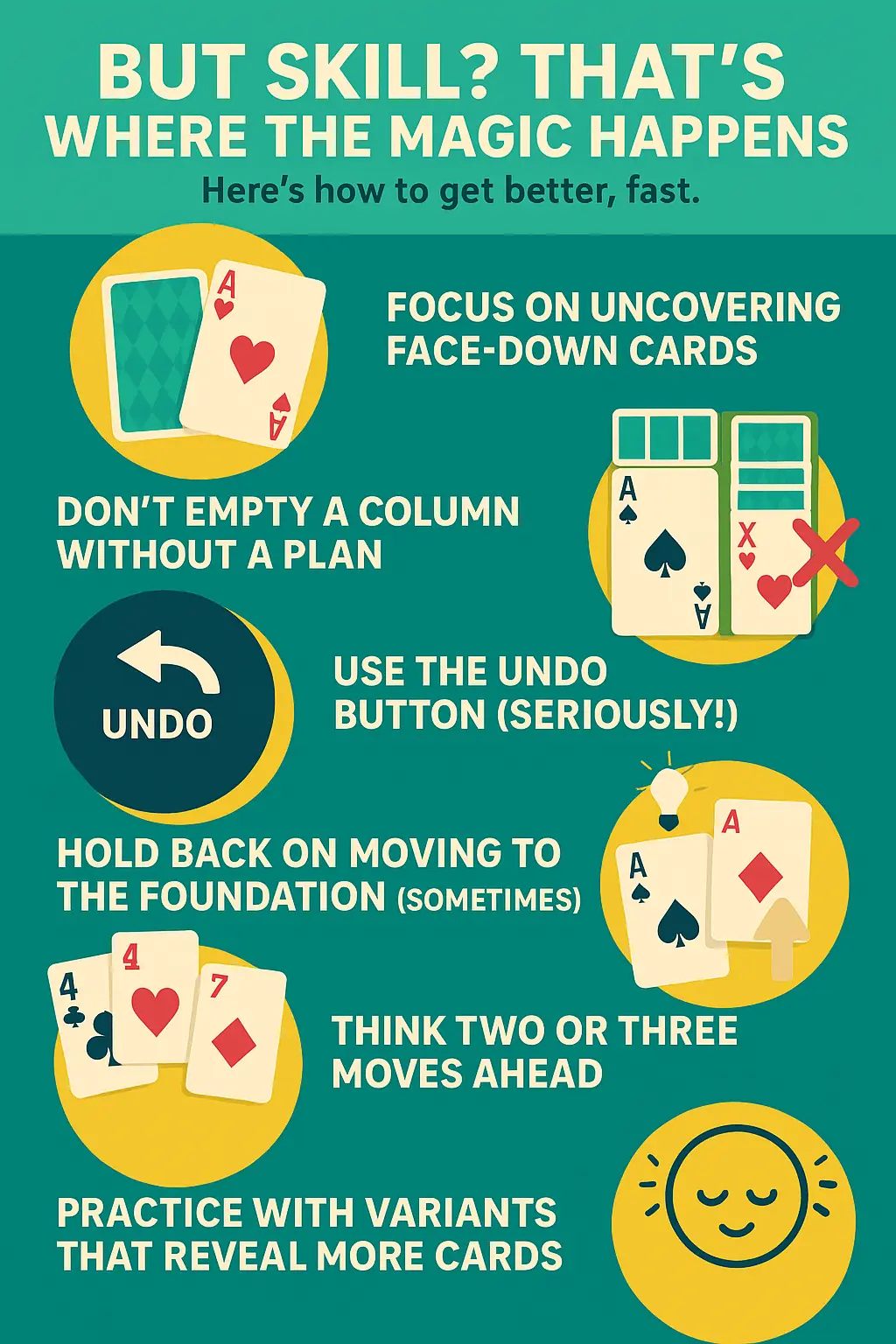Can You Win Solitaire Every Time?

If you’ve ever played a round of Solitaire and thought, “Wait, did I just get lucky?" you’re not alone.
Solitaire has a way of making you feel like a genius one minute and totally defeated the next. So what’s the deal? Is winning purely a matter of skill, or are the cards stacked (literally) against you sometimes?
Let’s unpack the role of luck vs. skill in Solitaire; and why both make the game so addictive.
First Things First: No, You Can’t Win Every Time
Even if you're a card-flipping prodigy with psychic powers... the answer is still no.
Some Solitaire deals are simply un-winnable from the start. No amount of smart moves or deep thinking can unlock a win if the right cards are buried, blocked, or just arranged badly.
That’s the luck part: you don’t control the shuffle.
But Skill? That’s Where the Magic Happens
Okay, so you can’t win every game. But want to win a lot more often? That’s where skill takes the spotlight.
The more you play, the more you’ll realize that Solitaire isn’t just about clicking cards and crossing your fingers. It’s a logic puzzle hiding in plain sight, and every move you make (or don’t make) matters.
Here’s how to get better, fast:
1. Focus on Uncovering Face-Down Cards
Every hidden card is a mystery, and usually a priority.
Your goal should always be to reveal new cards as soon as possible. The more of the board you can “see,” the more choices you unlock.
Tip: If you’re choosing between two legal moves, pick the one that flips a face-down card first.
2. Don’t Empty a Column Without a Plan
It feels SO good to clear a tableau column, right? But don’t do it just because you can. Only empty a pile if:
You have a King ready to move into the space (Klondike rules!)
You know it will lead to flipping more cards soon
Otherwise, you’re just trading space for... nothing.
3. Use the Undo Button (Seriously!)
Some folks see undoing a move as “cheating”, but it’s not. It’s called learning.
Backtracking lets you experiment, explore alternative paths, and figure out where you went wrong.
It’s like time travel for your brain
Try a move, observe the outcome, and rewind if needed. Your future self will thank you.
4. Hold Back on Moving to the Foundation (Sometimes)
It’s tempting to move every Ace and Two to the top immediately. But sometimes, keeping low cards in play gives you more flexibility in the tableau.
Why? Because you might need them to build sequences or clear piles.
Moving them too early can leave you stuck.
So before you auto-swipe that card up, ask: “Will I still need this down here?”
5. Think Two or Three Moves Ahead
This is where the pros shine. Anyone can see the next move. A skilled player sees the next few.
Each move you make should set up the next one.
Ask yourself:
What happens after I play this card?
Will I open up a new column?
Will I free a useful sequence?
Play like you’re playing chess...with cards.
6. Practice with Variants That Reveal More Cards
Want to fast-track your learning? Try games like FreeCell or Spider 1-suit, where more cards are visible and strategy matters more than luck.
These versions:
Reduce randomness
Let you practice planning and problem-solving
Make you feel like a Solitaire wizard
Once you sharpen your skills there, classic Klondike will feel like second nature.
7. Slow Down and Stay Calm
Last tip...but maybe the most important: don’t rush.
Solitaire rewards mindful play. The more calmly and carefully you think, the more likely you are to spot smart plays hiding in plain sight.
And hey, if you lose? No biggie. It’s all part of the brain-training process.

Is Solitaire Luck or Skill? (70% Skill, 30% Luck?)
There’s no exact formula, but many seasoned players agree: winning consistently comes down to strategy + decision-making, with a sprinkle of good fortune.
Think of it like cooking:
The shuffle gives you your ingredients (luck)
Your decisions are the recipe (skill)
And the final dish? That’s your outcome.
If you’re dealt bad ingredients, it’ll be tough. But if you cook with care, you’ll serve up something good more often than not.
Skill Grows Over Time
Here’s the fun part: even if you start out as a casual player, you’ll naturally build skills without even trying.
You’ll recognize useful card patterns
You’ll learn when a move helps… and when it traps you
You’ll develop better timing and planning instincts
Over time, your win rate goes up, not because the cards are better, but because you are.
Why Luck Isn’t a Bad Thing
A little randomness keeps things exciting. If every game were 100% skill-based, Solitaire might start feeling like a spreadsheet.
Luck brings surprise. It creates challenges. It’s what makes you say, “Ooooh, this one’s tricky!”, and then keep playing anyway.
Plus, losing a game you couldn’t win? That’s not failure. That’s freedom from frustration. You didn’t mess up, the cards just weren’t in your favor this time.
So... Can You Win Solitaire Every Time?
Nope. But here’s what you can do:
Play smarter
Learn from every game
Keep improving
Enjoy the mix of chance and choice
Avoid getting stuck
Because in the end, Solitaire isn’t about winning every time. It’s about that perfect moment when everything clicks, and the final card slides into place.
Want a Fair Challenge Every Time?
Play Solitaire Home Story, a relaxing, story-driven game where every level is carefully designed to be winnable. Strategy matters. Luck plays a role. And you get to help Alice rebuild her home while you do it.
